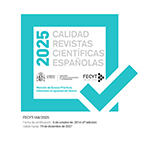Impacto de los conflictos ambientales en los sistemas partidarios subnacionales. El caso de Río Negro, Argentina (2017-2019)
Resumen
Este artículo aborda el impacto de los conflictos ambientales en los sistemas partidarios subnacionales de Argentina mediante un estudio de caso: el rechazo a la política de instalación de una planta nuclear en la provincia de Río Negro y sus implicancias políticas (2017-2019). Una heterogénea variedad de actores sociales, políticos y estatales con capacidad de representación y colectivos circunstanciales se posicionaron antagónicamente en la esfera pública en la disputa por la tematización de la política nuclear como problema ambiental. El proceso derivó en el surgimiento de un nuevo actor contencioso, el Movimiento Antinuclear Rionegrino (MAR), con capacidad de veto sobre la política nuclear, y un partido provincial con lema ambientalista, Rionegrinos por la Igualdad (RIO) con integrantes del primero. En torno a la tematización pública se desplegó un proceso de identificación y diferenciación entre quienes se asumían como damnificados por el proyecto y por los que lo impulsaban. Esta se expresó en términos ambientales y adoptó la forma de una controversia sociotécnica configurada por coaliciones discursivas (una pronuclear y otra antinuclear). La publicidad del rechazo a la política de instalación de una planta nuclear como cuestión que afecta los derechos ambientales y políticos de la ciudadanía operó como elemento para un momento democratizante. El conflicto ambiental suscitado tuvo efectos multinivel en arenas de deliberación pública tanto civil y social como político-institucional. Los efectos en este último plano pueden sintetizarse en tres dimensiones: normativa, partidaria y electoral. Concluyo que el conflicto ambiental incidió en la territorialización de la competencia intrapartidaria e interpartidaria y en la estructura de conflictos sociales sobre la que se desarrolla el sistema partidario provincial. Esta dinámica fue producto de la participación política ampliada de la ciudadanía y la estabilización del issue ambiental como elemento de la cultura pública en el marco del ciclo de conflicto ambiental de la Argentina del siglo XXI.
Descargas
Descarga artículo
Licencia
La revista Política y Sociedad, para fomentar el intercambio global del conocimiento, facilita el acceso sin restricciones a sus contenidos desde el momento de su publicación en la presente edición electrónica, y por eso es una revista de acceso abierto. Los originales publicados en esta revista son propiedad de la Universidad Complutense de Madrid y es obligatorio citar su procedencia en cualquier reproducción total o parcial. Todos los contenidos se distribuyen bajo una licencia de uso y distribución Creative Commons Reconocimiento 4.0 (CC BY 4.0). Esta circunstancia ha de hacerse constar expresamente de esta forma cuando sea necesario. Puede consultar la versión informativa y el texto legal de la licencia.











